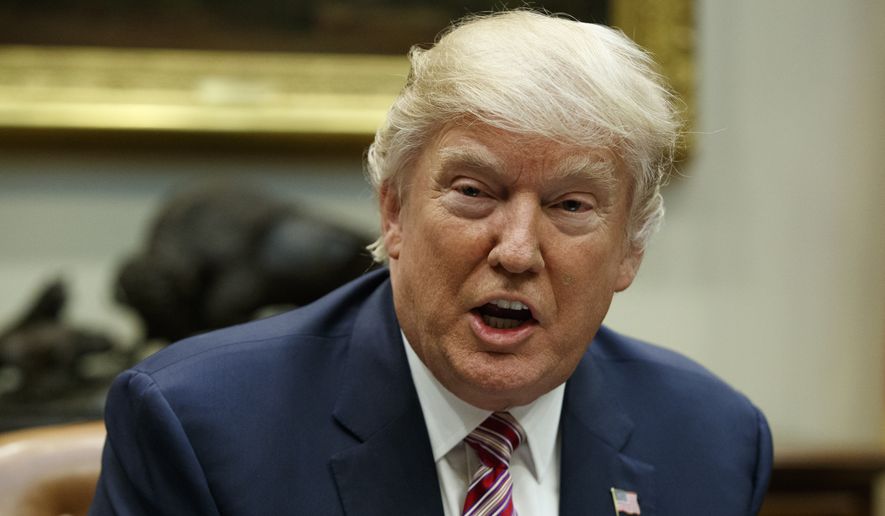President Trump’s plan for a $1 trillion program to rebuild America’s roads, bridges, railways and airports has won early support from leading budget hawks and anti-tax conservatives because it is expected to be more about regulatory reform and alternative financing than a federal spending spree.
Grover Norquist, founder and president of Americans for Tax Reform, described the infrastructure program being drafted at the White House as part of the biggest reduction of regulations envisioned since President Ronald Reagan, potentially clearing the way for massive private investment.
“We’ve had an eight-year war on infrastructure by the Obama administration,” said Mr. Norquist. “They tried to stop and did stop pipelines, coal production, gold exploration, mining of natural gas and fracking.”
Beyond the energy projects, which the president jump-started by reviving the Dakota Access and Keystone XL oil pipelines, he said Mr. Trump is poised to get more bang for taxpayer bucks on transportation projects by rolling back regulations that drive up costs on federal jobs.
“His intent to rebuild our infrastructure is real and he’s serious about it, but we should think of it as part of his deregulatory efforts,” said Mr. Norquist.
Doug Sachtleben of the anti-tax group Club For Growth spoke encouragingly about what Mr. Trump has signaled about the plan, such as the use of public-private partnerships.
“We also would encourage President Trump to scale back as much of the unnecessary federal costs in these projects as possible,” Mr. Sachtleben said.
The infrastructure package is in the queue with Mr. Trump’s tax reform plan behind the legislation being debated in Congress that would repeal and replace the Obamacare law.
All of these ambitious plans, including his promise of huge tax cuts and new spending on a border wall and rebuilding the military, will soon run into a cash crunch for the federal government and projections of soaring deficits.
Still, conservative lawmakers who have opposed the GOP health care legislation have signaled an openness to Mr. Trump’s infrastructure proposal.
A spokesman for Rep. Mark Meadows, North Carolina Republican and chairman of the conservative House Freedom Caucus, said the congressman is “very open to transportation spending so long as we can work out adequate pay-fors.”
The need for a nationwide infrastructure overhaul has grown urgent.
The American Society of Civil Engineers recently gave the U.S. infrastructure a D+ grade and estimated that needed repairs over the next four years would cost $3.6 trillion.
The infrastructure plan being drafted by the White House would include some federal spending but rely heavily on regulatory reforms and alternative financing, such as using toll roads and tax credits to attract private investments in highway and bridge projects.
“The focus of our team is the regulatory, statutory and practice reforms. It just takes so much money to put a shovel in the ground,” said a White House official familiar with the plan. “That’s what’s holding a lot of these projects up.”
Mr. Trump launched a deregulatory agenda as soon as he took office in January. He began by signing an executive order to expedite environmental review and approval of infrastructure projects, namely work on the U.S. electric grid, telecommunications systems, ports, airports, pipelines, bridges and highways.
The White House said they are prepared for resistance from Capitol Hill Democrats to the infrastructure package. Democratic lawmakers have a history of strong opposition to tinkering with rules and regulations such as requirements for environmental impact statements and for paying top wages to laborers on federal projects, measures they say protect the environment and workers.
Senate Minority Leader Charles E. Schumer and other Senate Democrats presented their own 10-year, $1 trillion infrastructure plan in January that relies entirely on direct federal spending. They proposed paying for it by closing tax loopholes.
At the time, Mr. Schumer said they were challenging the president to work with them to provide the badly needed spending to create jobs and repair crumbling roads and bridges.
The president isn’t buying it.
“The American people have seen that throwing money at problems just doesn’t solve all of our problems and you need to look at different ways to approach these issues,” said the White House official familiar with the plan.
Mr. Trump began enlisting private-sector partners at a meeting last week with business leaders, indulging Elon Musk, the billionaire co-founder of PayPal who created Tesla and the SpaceX.
Also attending the meeting were real estate and private-equity titans, including developer Richard LeFrak, Vornado Realty Trust CEO Steve Roth, and Apollo Global Management co-founder Josh Harris.
Mr. LeFrak and Mr. Roth are leading an infrastructure council that Mr. Trump is assembling.
Mr. Trump has made “national rebuilding” a priority for his administration and outlined his plan in a speech last month to a joint session of Congress.
“Crumbling infrastructure will be replaced with new roads, bridges, tunnels, airports and railways gleaming across our beautiful land,” the president said. “To launch our national rebuilding, I will be asking the Congress to approve legislation that produces a $1 trillion investment in the infrastructure of the United States — financed through both public and private capital — creating millions of new jobs.”
• S.A. Miller can be reached at smiller@washingtontimes.com.




Please read our comment policy before commenting.